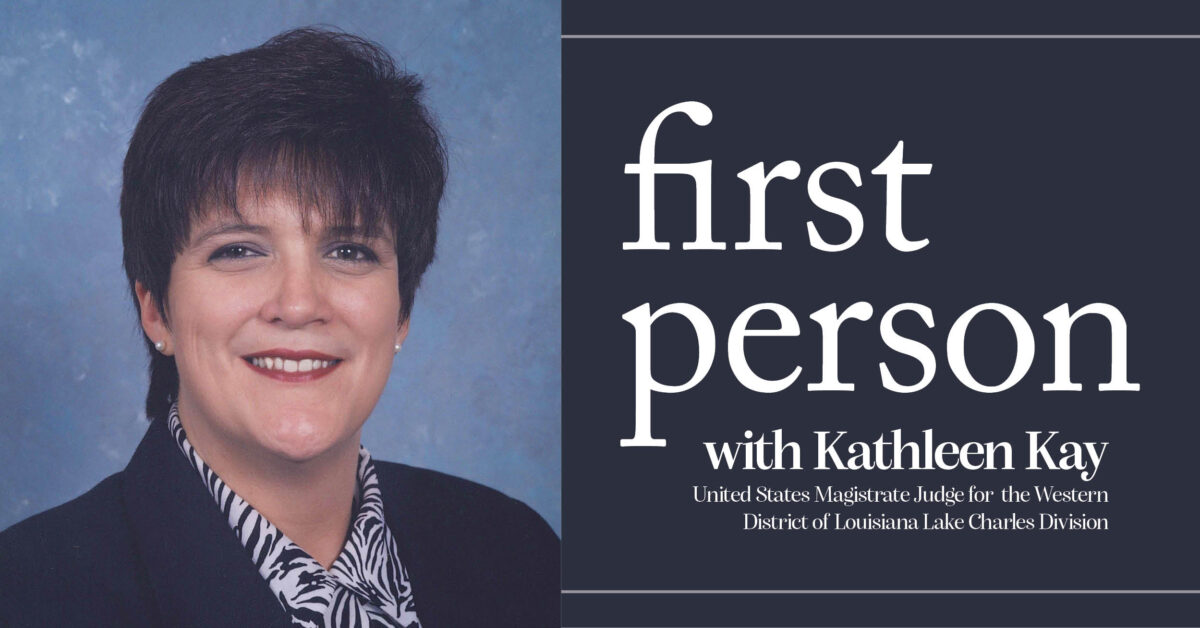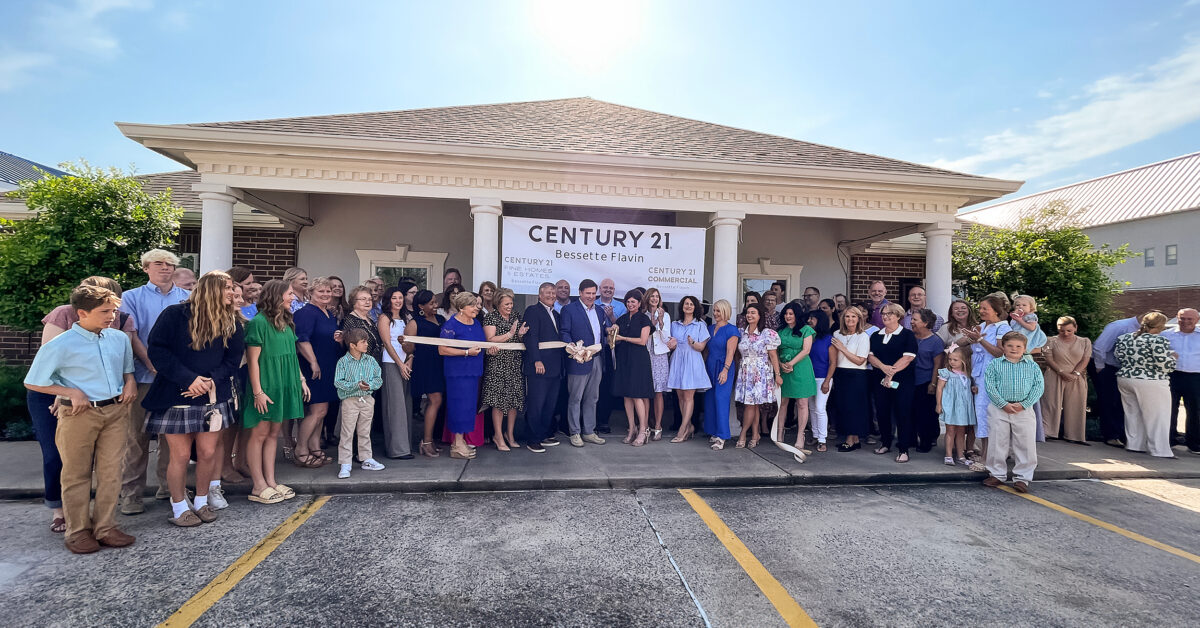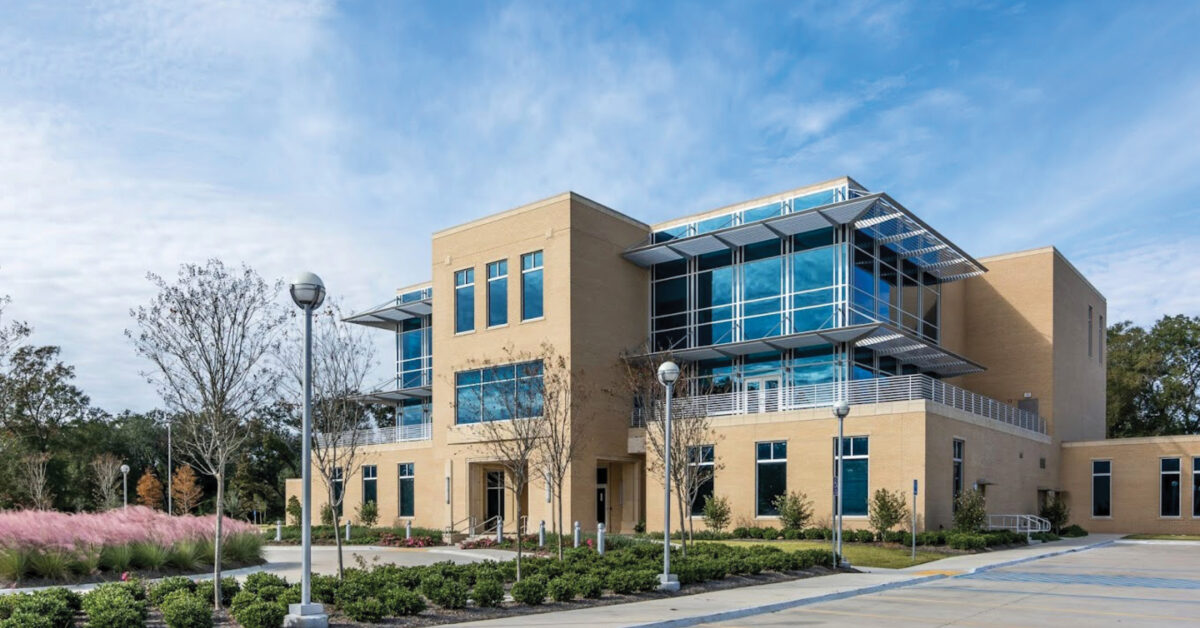
The Justice League
August 2023
Football Gold
August 2023First Person with Kathleen Kay, United States Magistrate Judge for the Western District of Louisiana Lake Charles Division
By Taylor Trahan Henry
Kathleen Kay was born and raised in Lake Charles as the sixth child of Lewis and Louise Harrop Kay. A product of local Catholic schools, Immaculate Conception School, and St. Louis High School, Kathleen eventually settled in Lake Charles and raised her two children here alongside her husband, Scott McPherson. After deciding on, and completing, law school, a series of events would lead her to sixteen years of service as a Magistrate Judge for the United States District Court. An honor considering that, at any given time, there are only a little over 500 people in the entire country serving in that role. As she prepares for retirement in 2024, Thrive caught up with Kathleen to get a glimpse into her career, life, and plans for when she hangs up her robe.
Was there any experience or influence in your early years that gave you an inkling you’d be in law one day?
I truly had no idea what I would do when I “grew up.” Even when I started college, I was unfocused, at one point stopping my college career until I could figure it out. I was working for attorneys as a secretary – positively the best experience one can have for a future in law – when the idea sparked. According to one of my former employers and dear friend, C.A. King, II, I looked at him one day and said “Hey – if you can do this then so can I.” Initially, I thought I would be a paraprofessional. It didn’t occur to me at the beginning that I could go for the brass ring. But then one of my older sisters, Carolyn, said “why in the world would you think you can’t do that? Geaux for it!” And I did.
Tell us about your formal education in law and your time as an LSU Tiger. What were your favorite parts of studying law?
I received my bachelors in 1982 from LSU – two years behind a normal schedule due to the aforementioned sabbatical – and started at the Paul M. Hebert Law Center at LSU in the Fall. Anyone who has been through the experience will agree that the first semester is terrifying – there are no tests during the semester, and you live and die by your final. You go through an entire semester not really knowing if you “get it” or not. Fortunately for me, and thanks in large part to the practical experience I got from being a legal secretary, I did “get it” and did very well. I was invited to join the Louisiana Law Review, an honor, at that time, reserved for the top of the class.
Even during that first terrifying year, I had a blast. I was extremely fortunate to have some of the most awesome professors to walk the halls at LSU. Namely, Professor George W. Pugh, Professor Saul Litvinoff, Professor “Wild Bill” Crawford, and Professor W. Lee Hargrave. I met some of the most wonderful people, fellow law students, many of whom remain friends to this day. We worked and studied hard but, as no surprise to anyone who knows me, we found time to have a lot of fun as well. I will always remember law school as being three of the best years of my life.
How did your career begin? What type of law did you start out in?
I was fortunate enough to be invited to clerk for the Honorable Earl E. Veron, United States District Judge for the Western District of Louisiana, and that’s how I came to be back in Lake Charles. I was unattached at the time and hoping one day to be able to settle down and start a family but mistakenly thought I needed to be outside of Lake Charles to do that. As soon as I got home, I began dating a really great guy from the Pacific Northwest – he was smart, had a college degree and a great sense of humor. And suddenly settling down in Lake Charles seemed like the right idea. It was not long before a local firm showed an interest in me and hired me to work for them when I completed my clerkship. My primary field of work at the beginning was insurance defense work, much of that in maritime. I really, really enjoyed that. One of the things I loved best about that type of work is that, to effectively represent my clients, it was important to become immersed in how the client’s business or industry worked For example, I’d learn what happens on the floor of a drilling rig so that I could understand how an accident happened or how seismic activity worked so I could understand how or whether seismic activity could crack mortar or brick. I met and was tutored by so many wonderful people.
As time went by and we started our family, things changed and so did the type of law in which I specialized. My husband traveled often for work and thus my ability to travel was less. The market for maritime work in Lake Charles had dried up – pun intended – significantly and insurance defense work became problematic for small groups for reasons no one would find interesting. So, I began to focus on family law. Family law was local, and it allowed me to deal with real people. From then on, family law was basically all I did until I closed my private practice.
Tell us about your appointment to Magistrate Judge and what that process looked like for you.
In the mid-2000s, I had the opportunity and applied for the position of United Magistrate Judge for the Western District of Louisiana. Magistrate Judges are appointed by active and senior status Article III, or district, judges – those that are appointed for life following nomination by the President and confirmation of the U.S. Senate. The process is long and tedious but, at least in my case, well worth the effort. Appointments for Magistrate Judges are a term of eight years. I am nearing completion of my second term and will be retiring effective 1/2/2024. I am so grateful to the judges of the Western District of Louisiana for the confidence they showed in me and very appreciative of the assistance and support they have given. They, as well as my fellow Magistrate Judges, are a wonderful group of caring people. I am so lucky to have worked with them all, past and present.
What do you enjoy most about the job you’ve had for the last 16 years? What keeps the fire for justice burning?
I was very concerned when I accepted this appointment that I might become bored with doing the same things repeatedly. In hindsight, I need not have worried. This job has given me the opportunity to return to a more academic mode. Unlike the role you serve as a litigator, where you are advocating for a particular position, as a judge it is your role to consider both sides and determine, to the best of your ability, what result the law requires given the circumstances presented. The job requires a totally different tool set than does litigation, but it is one that I have thoroughly enjoyed. I have had the opportunity to work with very skilled counsel. I have seen some top-notch litigation that has been a real joy to watch from my perch, if you will.
As you mentioned, you’re nearing retirement with a beautiful grandson and plenty of sports to take in. What are you looking forward to the most?
I truly cannot believe the time is here. My husband, who retired several years ago, and I look forward to travelling – both planned travel and “hey let’s go to __ tomorrow” kind of travel – to visit friends and family. We are so lucky that our two children are grown, responsible adults now with lives and loves of their own. Our daughter and her husband gave us the greatest gift of all 15 months ago – the most awesome, intelligent, and handsome grandson two grandparents could possibly have. We have already had the pleasure of traveling and visiting with our kids and the families of their chosen ones and look forward to more of that.
I am also keenly interested in ramping up my personal contributions to the Southwest Louisiana area. While serving in my role, the Code of Conduct for United States Judges does limit the type of work that I can do and the role I can play in any organization. In retirement, I’ll have more freedom to get involved in different capacities. I’m hoping to continue working with the SWLA LSU Alumni Association, Home Fest, and whatever other opportunities become available.






